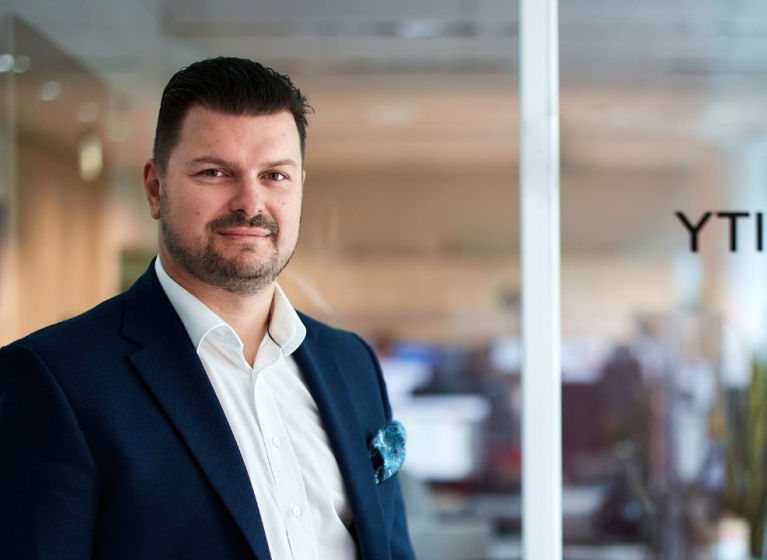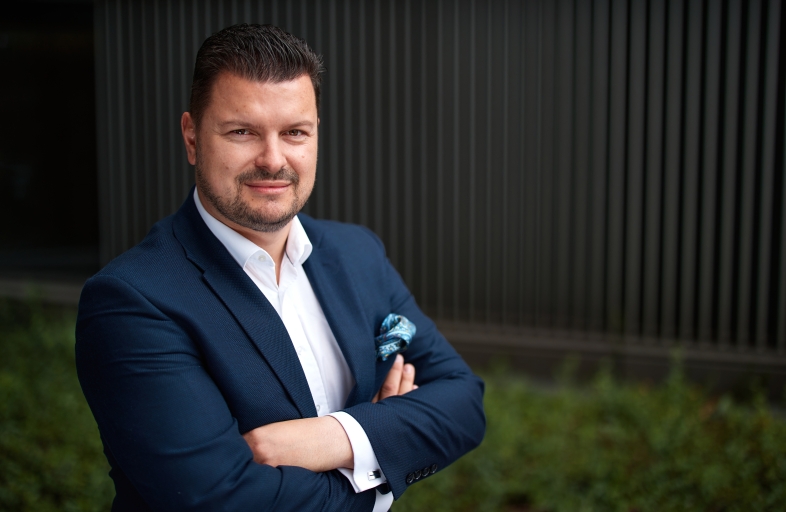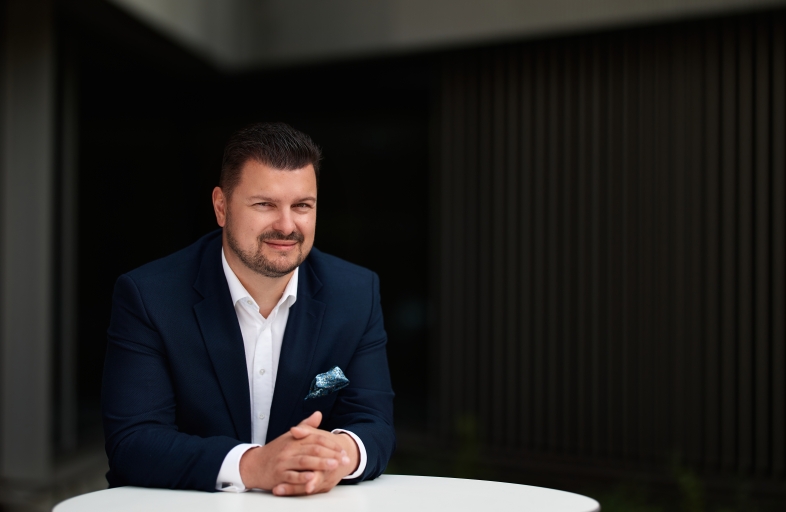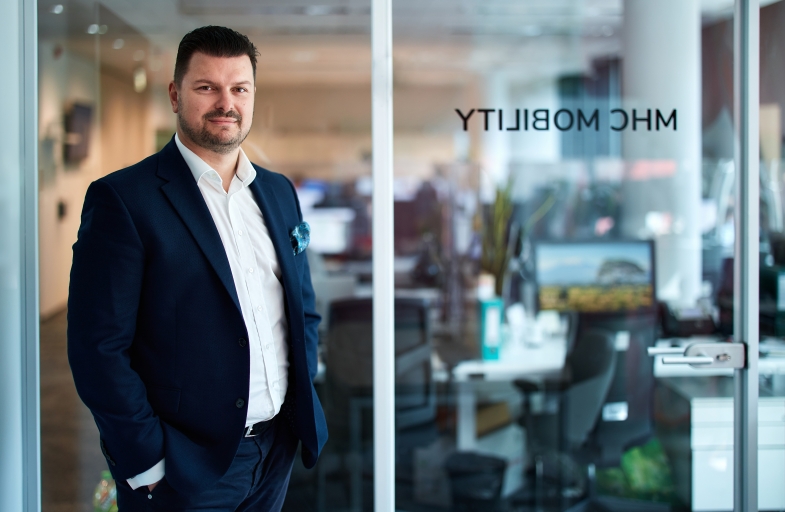Electrification in the automotive industry is growing steadily and electric vehicles are increasingly being chosen by companies as well. Przemysław Gazda, Operational Director MHC Mobility CEE, talks about what the future of the automotive industry looks like and the challenges it faces.
- You have been with MHC Mobility for a year now, have you been interested in motoring since the beginning of your career?
I joined MHC after working for nearly 10 years at another CFM company. I have been interested in motoring since I was a child. At the age of 10 I already had my first combustion engine, a Pony motorbike, which I used to tinker with all the time - with varying success. Subsequently, my choice of high school and university course was connected with the automotive sector. It was clear that I wanted to develop professionally in this area too. I was fortunate enough to be able to gain experience at virtually all stages in my career with regard to the vehicle life cycle and the processes involved, as well as the different perspectives and levels of customer service. I started with an apprenticeship as a mechanic's assistant. After that, I worked as a painter, mechanical service manager and bodyshop manager. Eventually, I made the decision that I wanted to see what it all looked like from the other side. This is how I ended up in the CFM industry, where I was the person responsible for the claims and mechanical repair processes, assistance and the driver desk. Such a cross-section of positions gives a much broader perspective on how the industry looks from different sides, from the inside and from the outside and, importantly, how it has changed over the years. And I try to put this knowledge to practical use in my current position as Operations Director. - Recently, MHC Mobility entered into an electromobility partnership with the retail chain RTV EURO AGD and delivered its first electric vehicles. Also TESCO was the first company in Hungary to opt for fully electric delivery vehicles. How do you see the future of electromobility?
Electromobility is the future of our industry. All corporations have such solutions and are constantly developing them, outdoing each other. This is driving competition, but it also opens up more and more opportunities for customers, who can choose from a variety of manufacturers offering really high-quality solutions. Customers are aware of the need for change as a result of current market trends, where increasing emphasis is being placed on environmental protection, saving fuel resources and being as eco-friendly as possible. What is more, they themselves are increasingly interested in such solutions, which in a way also forces the industry to follow the trend towards electromobility. RTV EURO AGD and TESCO are excellent examples. For both of the aforementioned companies, we supplied specially prepared and customised vehicles with specialised bodies. The vehicles for TESCO are equipped with a battery-powered electric refrigeration unit from ThermoKing. This unit is emission-free and has a lower noise level. We are seeing that electric cars are an increasingly common choice for our customers, making conscious, environmentally friendly decisions. The energy and cost efficiency, combined with the range of economic conveniences offered by electric vehicles, are helping companies build a competitive advantage now and into the future. As a partner and supplier, MHC Mobility is able to provide a full range of services, from vehicles (including specialised vehicles) to charging stations or hybrid cards. We meet the expectations of our customers and are pleased to see that lower emissions are an increasingly common criterion for vehicle selection. - Is the Polish market ready for electromobility? What are the challenges and the industry's greatest hopes?
We are definitely ready, which does not change the fact that we should still strive to introduce even better solutions. The current infrastructure allows for efficient movement of an electric vehicle, not only within cities, but also between them. Travelling by vehicle from Warsaw to Zakopane is possible without much of a problem with one stop for a coffee. With the use of charging cards, we offer access to more than 900 public charging stations. We still have some way to go to catch up with the infrastructure that is in place in, for example, Norway, the Netherlands or the UK. The main challenges facing our market are to expand the charging infrastructure and increase the number of dedicated parking spaces. We should therefore focus on making the use of electric vehicles easy and enjoyable, rather than associating it with planning a driving route in terms of available charging spaces. Equally important - in view of the current increasing problems with power station capacity shortages - is to secure the performance levels of the power grids in the long term as well as to consider the use of alternative energy sources. As far as the industry's hopes are concerned, we hope that electromobility will continue to be actively supported by government programs and subsidies. This kind of financial support also makes smaller family-run businesses interested in electric cars. Electrics are no longer associated exclusively with large companies. - What new mobility trends do you see? Is MHC Mobility striving to create them?
Customers are increasingly interested in electric vehicles, the upward trend has been evident for several years now and there is no sign of this changing. It is a sign of our times that we want to try out newer and newer options, to use things and vehicles and not necessarily own them outright. This is why customers often opt for solutions available within the framework of so-called micromobility. We are talking about electric bicycles, scooters, as well as Eidola Cargo, i.e. small, light commercial vehicles, which we call the protagonists of the last mile, because they work well in urban logistics as the final element of the supply chain, among other things. At MHC Mobility, we are following the electromobility trend and our aim is to create new solutions that will set us apart from the competition. We are able to provide customers with all types of mobility support vehicles, including a full package of accompanying products, i.e. chargers, charging cards or the possibility of storing bicycles and scooters in winter. - Are there many companies like MHC Mobility on the Polish market? What are the characteristics of the competition and does this make it more difficult to win and retain customers?
In Poland, we are the only company that is able to supply the customer with all types of vehicles, from truck tractors to heavy and light specialised vehicles, passenger vehicles and vehicles from the micromobility range. At the same time, we want to distinguish ourselves from the competition by our unconventional approach to the Customer's expectations, as well as the versatility and comprehensiveness of our offer. We are limited only by the imagination of our customers. Our aim is to meet even the most unobvious and sophisticated needs. We want to be a partner as well as an adviser to our clients, to provide a high level of service and to help them achieve their business goals and objectives. Competition on the market is fierce, but I am convinced that thanks to our approach to our clients' expectations, they will have no doubts when it comes to making a decision about continuing our cooperation. - What is MHC Mobility's direction, what is its focus and what are the company's development plans?
We want to further develop in the areas of decarbonisation, providing customised, tailor-made solutions for customers. A good example of the direction and approach of our organisation are the vehicles prepared for TESCO and RTV EURO AGD, where we were the first in the market to be able to prepare and deliver such modified vehicles. We will continue to develop our offer in the field of electro- and micromobility. We ourselves have made a commitment to eliminate the fleet powered by traditional fuels and switch fully to alternative propulsion by 2030. - How large is the team you lead and what sets it apart? How do you skillfully lead the team so that each person on the team feels satisfied with their tasks?
We currently have a team of more than 30 people in the operational structure of the Polish branch. They are specialists in their respective areas, people with passion, who perform their work conscientiously and with commitment. We benefit from the potential and talent of young trainees and make use of the experience of long-term employees. The team is diverse in terms of age. It is a collection of individuals, but they form a harmonious team. In my opinion, the key to employee satisfaction is clearly defined goals and skillful motivation on the part of the leader, who is able to encourage their realisation. Attention to team members, time for individual meetings and, of course, feedback on ongoing tasks is also, if not primarily, a positive one. I try to make my employees feel that they are the driving force behind our organisation and that both the level of customer service and the course of many processes depend on them. Each one of them therefore has a real influence on how our processes look and the opportunity to influence how they will look in the future. I think that such a driving force also motivates us to act and brings a lot of satisfaction with the tasks performed. - Providing good customer service is fundamental. What is the greatest emphasis for MHC Mobility?
I expect my team to be proactive in their daily tasks, to be available to the external customer and to work closely and proactively with other departments within the company. The ability to work as a team is key here, as well as benefiting from the support and experience of colleagues. After all, we are all playing to one goal, and our common goal is a high level of satisfaction for our customers. We are also keen to work very well and closely with suppliers, for whom we want to be a valuable and well-regarded partner. After all, at the end of the day, they are the ones who represent us in our dealings with the customer in day-to-day service. At MHC Mobility, our focus is on solving and preventing problems, not creating them. Our aim is for customers and suppliers to associate us with precisely this approach to their expectations and requirements. - Do you derive a lot of satisfaction from your work, what do you enjoy doing?
I enjoy my work and I make no secret of the fact that it brings me a great deal of satisfaction. This is simply because I do what interests me. I'm glad that I was able to realise my teenage dreams and, despite my young age, I've gained a great deal of experience in different areas, in different positions, now being able to develop in an even broader aspect within the MHC structures. Taking on new challenges, especially in handling highly customised vehicles, is exciting and motivates me. It also satisfies me to support the development of my team members. It is with undisguised pride that I watch them develop their talents, get promoted and move up the career ladder. But what gives me the greatest joy is the honest feedback from my colleagues when I hear that, despite being a demanding boss, they find working with me a really valuable experience.






